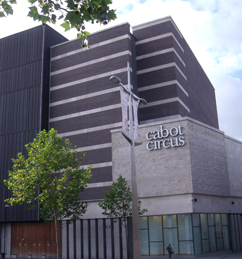Business Improvement Districts (BIDs) should include business crime in their work – and what they spend their millions on, says a manifesto backed by high street names.
The manifesto, fronted by Tim Edwards, Group Profit Protection Director at JDSports and written by National Business Crime Solution (NBCS), points out that the 300-plus BIDs have around £100m a year, from levies on businesses within BID areas, typically town and city centres. A reasonable proportion of this should be dedicated to tackling business crime, says the manifesto. The document calls on BIDs to state what they will do about business crime; survey their locality; and whatever they do, ‘any response should be proportionate and is best delivered in partnership’.
As the document says, the overall aim of a BID is to make its area better trading locations, more attractive to customers and users. The NBCS seeks more engagement between BIDs and many of their levy payers (who may also be NBCS members). The BIDs Foundation, the town centre trade bodies ATCM (Association of Town and City Management) and British BIDs were consulted on the drawing up the manifesto, besides Revo, the retail property trade body and the Association of Convenience Stores (ACS). BIDs date from the 2000s; where business districts felt local government was not providing enough services. The manifesto says that due to policing cuts, businesses are asking their local BIDs for greater efforts to address safety, security and crime reduction issues. But if BIDs fail to respond to this, it could adversely impact trading and lead to business closures, the manifesto warns. It points to increased violence towards staff. “Retailers want their staff to be able to work free from fear of threats and violence, which is an increasing priority. Therefore, protecting their staff as well as their stock and premises is a major concern for all business who want a centre that is safe and welcoming throughout the day and night. Not only that but finding ways to combat public safety issues such drugs, alcohol, begging and rough sleeping will all have an impact on the trading environment and indirectly affect businesses.”
As the document acknowledges, businesses are also backing business crime reduction partnerships (BCRPs) which work on the same principle as BIDs, except that if a business is inside a BID area, it has to pay the levy; paying to be a member of a BCRP is voluntary. As the manifesto admits, if BCRPs and BIDs are both around, it can cause confusion; a BID might assume work against shop theft, such as gathering intelligence and running retail radios and exclusion schemes, is for a partnership to do. Each BID is different and while some may offer security-type work, such as wardens patrolling, and CCTV monitoring, others may be slanted towards street cleaning, marketing and events. As for the complaint that businesses are already paying for police in tax, and are being asked to pay twice, the manifesto admits that to get extra services from a BID businesses may have to pay ‘a higher levy or top-up’.
The manifesto also quotes Darren Conway of Sports Direct; and Colin Peters of WH Smith. Examples of good work are quoted from Great Yarmouth (which runs the town’s CCTV 24-7 for the council), Broadmead in Bristol city centre which according to the manifesto is acting on ‘underlying drug and rough sleeping issues’ that are ‘prominent and growing’; and Reading, where the BID is part of the crime reduction partnership and likewise does work about beggars and rough sleepers, such as clearing up after them and backing a cloud-based database for banning offenders.
Picture by Mark Rowe; Cabot Circus, Broadmead, Bristol.










